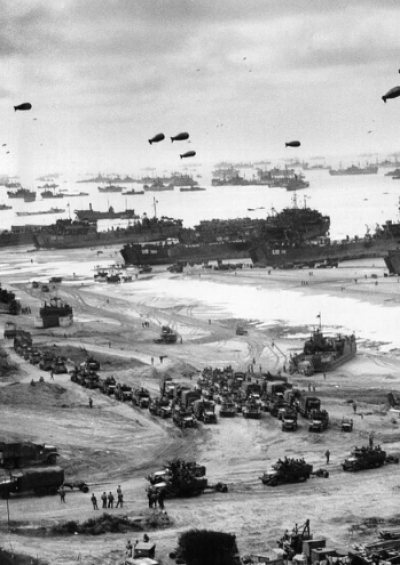D-Day: The End of Wars?
How much did D-Day contribute to ringing in the end of nation state warfare?
June 4, 2004

The fall of Hitler's Third Reich on VE Day, May 8, 1945, was not just end of the war in Europe. It also signaled the end of the European tribal wars of Europe's nation states that had raged periodically for some 400 years.
The nation states spread out
Almost as soon as Europe's great nation states began to form in England, France and Spain they began to fight. They fought among themselves — and with those pre-modern state systems of the Tsarist and Habsburg Empires and the Prussian monarchy.
Europe's 19th century was defined in part by the spread of the nation state power with the British and French colonial empires — and in part by the eventually successful efforts of the Italians and Germans to establish nation states (and colonial empires) of their own.
Once this process was complete, Europe's nation states plunged into the collective suicide of the First World War, from 1914-1918 — and then, with a brief pause to regroup, into the Second World War from 1939-1945.
Seldom in history has a civilization so dominant collapsed with such speed. In 1914, Europe accounted for over 60% of the world's wealth, as measured by GDP. Its empires — including Russia — covered over 80% of the world.
End of European tribalism
Europe's 20th century tribal wars ended all that. The colonial empires have gone, along with their former preponderance of wealth.
Even the nation states are no longer what they were, as they pool ever more sovereignty into the European Union. Today, even with the prosperity of the EU — and even including Russia — Europe accounts for less than 25% of the world's GDP.
The two tribal wars — and the brief and bizarre peace that separated them — killed nearly 20 million Russians, 10 million Germans, 4 million French and 1.5 million Brits. Another venerable European tribe — the Jews — was very nearly exterminated on Europe's shores.
And that peace from 1919-1939 was a peace marked by extremism. Left to its own devices after 1919 — as the United States withdrew into its period of isolation and the Russians imploded into the disastrous Bolshevik experiment — Europe went into the political equivalent of a nervous breakdown.
Fascism in Italy, Nazism in Germany and Stalin's monstrous gulag of a police state were the grim symptoms of a collective insanity.
That were only resolved by another world war — and then by 50 more years of Cold War.
Cold War peace
Europe's post-1945 peace was secured by the presence of U.S. and Russian troops — which meant that the warring tribes finally had some adult supervision.
In the U.S. protectorate of Western Europe, democracy and prosperity emerged under the benign U.S. presence.
The shield of NATO allowed the post-nation state system of the European Economic Community — now the EU — to take shape and prosper.
Even behind the Soviet-ruled Iron Curtain, a kind of stability was established. It was no accident that the withdrawal of Soviet forces from their half of Europe saw the re-emergence of Old Europe's tribal violence, as the Balkans erupted in the wars of the Yugoslav Succession.
And once again, with the EU unable to keep the peace on its own continent, it took the deployment of U.S. troops in both Bosnia and Kosovo to impose a rough peace on the Balkan states.
European contradictions
The Europeans are an extraordinary race — at once the most creative and the most dangerous on the planet. They brought the world the Renaissance, the Reformation and the Enlightenment.
They devised the drama, the novel, the opera and the symphony orchestra. They invented trial by jury and human rights, the parliament and universal suffrage. They did not invent slavery — but they abolished it.
But they also brought the world genocide, imperialism, concentration camps and universal conscription, the nation state organized for war — and all financed by that other great European invention, the income tax.
It would be a great relief to say that D-Day can still be celebrated as the moment when the endemic violence of the European tribes came to an exhausted end. And the presence on the Normandy beaches this year on June 6, the anniversary of D-Day, of the German Chancellor Gerhard Schroeder, is a happy symbol that Germans too feel that they were somehow liberated by their nation's utter defeat in 1945.
Certainly, the great achievement of the European Union has been to make it seem that nation state wars between the French and Germans and British and Italians are finally over.
Mind-boggling costs of war
The scale of their wars still stuns the modern mind. There is an ossuary, a memorial composed of bones, outside the French city of Verdun, that is said to contain the bodies of 2 million Frenchmen and Germans who died there.
On the top of Belgium's Passchaendaele Ridge, the visitor can gaze down some six miles to the old cloth town of Ypres.
For every single inch of those seven miles, clawing their way up the mud and barbed wire, one German and one Brit died. In the German war cemeteries, they numbers were so great that they buried them by the year.
And the slaughter did not stop with Europeans. Indian troops of the Raj died there, along with Australians, New Zealanders, South Africans — and Americans.
Particularly poignant are the Canadians, who died as the first victims of poison gas in the 2nd battle of Ypres in 1915. The battlefield of Ypres is in its way as grisly a memorial to European civilization as Auschwitz.
Peace at last?
Perhaps, at last, the great European madness is finally over. Perhaps. The example of the Balkan wars of the 1990s suggests that belief in such a pacific outcome might yet be premature.
That is why this year's anniversary of the D-Day invasion, is just as important for the European future as it is a commemoration of the past.
But it may be too much to hope for — in this period so deeply scarred by transatlantic disputes over Iraq — that the D-Day anniversary will remind the querulous Europeans of the debt they owe to the Americans for their current peace and prosperity.
Takeaways
VE Day was not just end of the war in Europe. It also signaled the end of the European tribal wars of Europe's nation states.
European nation states are no longer what they were, as they pool ever more sovereignty into the European Union.
Fascism in Italy, Nazism in Germany and Stalin's monstrous gulag of a police state were the grim symptoms of a collective insanity.
The D-Day anniversary will remind the querulous Europeans of the debt they owe to the Americans for their current peace and prosperity.
Read previous
Looting as a Unification Strategy?
June 3, 2004
